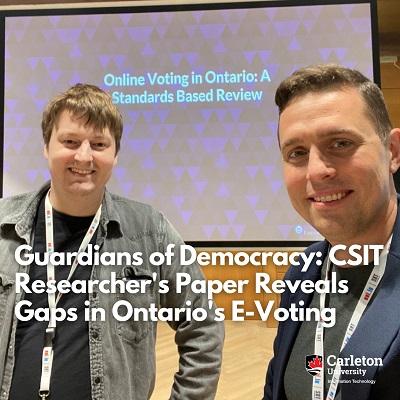Paper by CSIT Expert Reveals Gaps in Ontario's E-Voting

October 6th, 2023
In a groundbreaking revelation, Mr. James Brunet, a full-time instructor at Carleton University's School of Information Technology, and his co-author, Dr. Aleksander Essex of Western University, have unveiled a significant disparity between the practice of online elections in Ontario and international best standards. Their research, presented at the Eighth International Joint Conference on Electronic Voting in Luxembourg, highlights the absence of provincial standards in Ontario for regulating online voting, leaving local election officials to devise their own cybersecurity measures. This article delves into their findings and the implications for online voting in Ontario.
The Research:
Mr. Brunet and Dr. Essex based their analysis on the Council of Europe's (CoE) standards for e-voting, comprising 141 directives that guide jurisdictions in conducting secure online elections. To determine Ontario's compliance with these standards, they employed a comprehensive approach, including:
1. Analyzing security claims by online voting vendors.
2. Scrutinizing municipal documents such as by-laws, purchase agreements, city reports, training materials, and voter instructions.
3. Conducting a limited security assessment of the six online voting vendors operating in Ontario.
4. Identifying common security incident-related themes through news articles.
5. Examining municipal websites and social media for security incident response communication.
6. Sending follow-up questions to municipalities for clarification.
The Findings:
The research findings are striking. Ontario's municipalities were found to be broadly non-compliant with international e-voting standards, satisfactorily meeting only 14% of the 126 relevant directives. The most concerning aspect is that Ontario municipalities not only fall short in various categories but disproportionately struggle with standards related to transparency and regulatory requirements. This raises critical questions about the security and integrity of online elections in the province.
Implications:
The absence of standardized regulations for online voting in Ontario leaves room for inconsistency in cybersecurity measures across municipalities. This lack of uniformity poses potential risks to the security and transparency of online elections. Mr. Brunet and Dr. Essex's research underscores the urgent need for the province to establish robust guidelines and regulatory frameworks to ensure the integrity and security of digital voting.
Conclusion:
The research presented by Mr. James Brunet and Dr. Aleskander Essex sheds light on a pressing issue in Ontario's online voting landscape. Their work highlights the significant gap between the province's practices and international e-voting standards, emphasizing the importance of addressing these concerns promptly. As we move towards an increasingly digital world, ensuring the security and transparency of online elections is paramount.